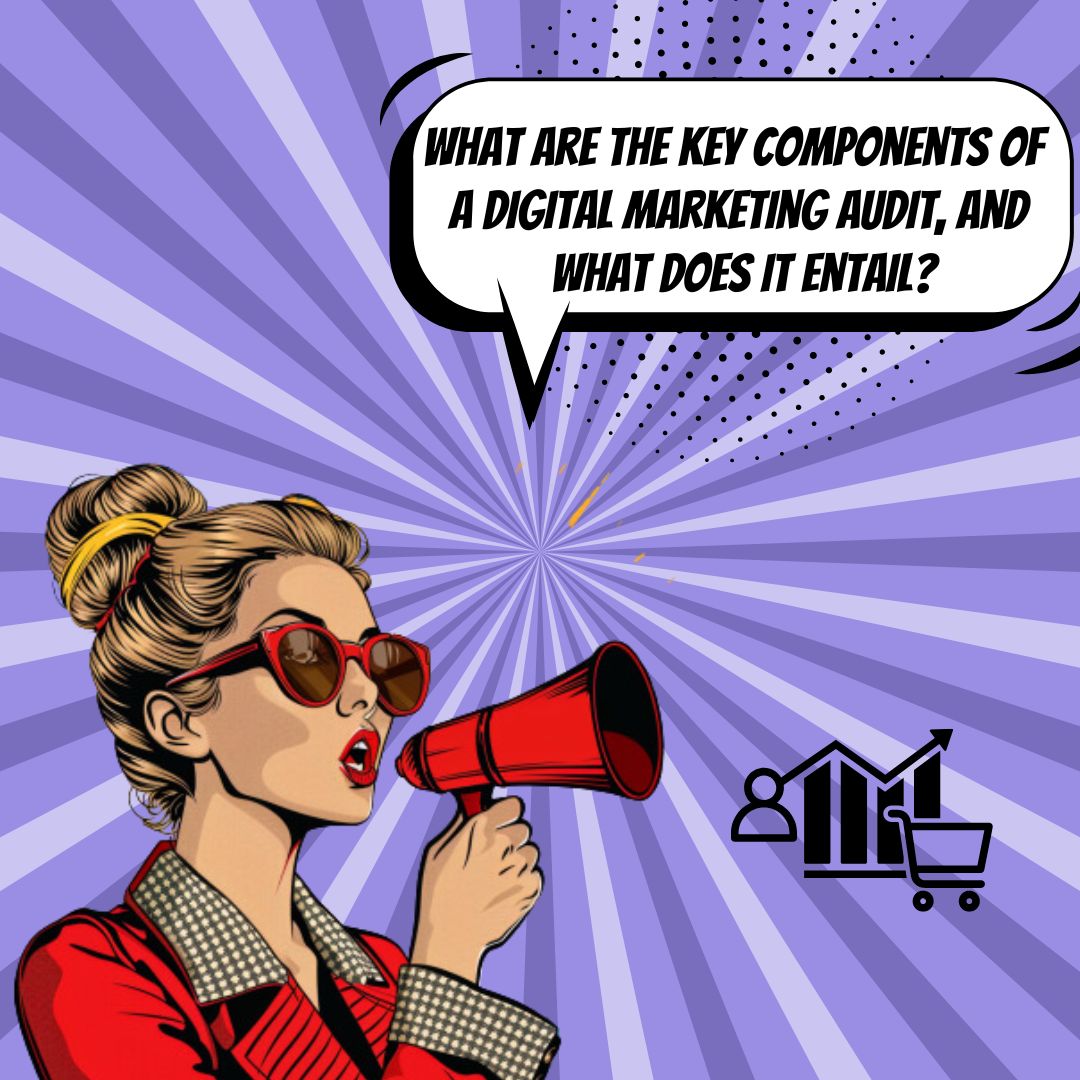Key Takeaways
✅ Comprehensive Analysis: Dig deep into your digital landscape with a full-scale audit that reviews SEO, content, PPC, and UX practices. Statistics reveal businesses that conduct regular audits can improve their conversion rates by up to 50%. Formulate a plan to revitalize areas lagging behind and bolster those that shine.
✅ Holistic Approach: Don't let any stone unturned – ensure your audit covers all bases, including social media, paid ads, and email campaigns. Firms that adopt this multi-channel perspective often see a 25% increase in overall marketing effectiveness. Tailor your strategy for a cohesive and unified digital presence.
✅ Data-Driven Insights: Base your marketing decisions on hard data, not hunches. By tracking and analyzing performance data, many businesses can reallocate resources to increase ROI by up to 30%. Use your audit to fine-tune your actions, meet business goals, and craft a pathway to growth.

Introduction
Are you fully capitalizing on the vast opportunities available in the digital world? Think of your online presence as a dynamic ecosystem – constantly evolving and ripe with potential. A digital marketing audit isn't just a health check; it's a strategic tool to unlock hidden growth. But what exactly does it entail, and why should it be a cornerstone of your digital strategy?
Effective auditing provides clarity, not just a checklist of do's and don'ts. It's the process that sifts through the noise to reveal the heartbeat of your online endeavors. Can you afford to make decisions in the dark, or are you ready to bring your online strategy and performance into the light? Stay tuned as we dive into innovative perspectives and modern trends that could revitalize your digital touchpoints and maximize your revenue opportunities. Let's embark on this journey together, as we unveil the critical insights and revolutionary information that could set your brand apart in the bustling world of digital marketing.
Top Statistics
| Statistic | Insight |
|---|---|
| Duration of a Digital Marketing Audit: Typically ranges from 3 to 8 weeks. | The timeframe underscores the thoroughness and depth of analysis required to evaluate an online presence effectively. |
| Importance of Website Design: 75% of a website's credibility comes from its design. | This highlights how crucial a professional and user-friendly design is for establishing brand trust and credibility. |
| Trust in Online Reviews: 79% of consumers trust them as much as personal recommendations. | Emphasizes the importance of managing online reputation and the significant impact of customer feedback on buying decisions. |
| Frequency of Digital Marketing Audits: Companies ideally conduct them annually. | Regular check-ups can lead to consistent improvement and ensure strategies remain fresh and effective in a fast-paced digital world. |
| Role of Artificial Intelligence: AI simplifies data-related tasks and aids in strategy development. | Utilizing AI can offer advanced insights and efficiency in processing large datasets, which is invaluable for optimizing digital strategies. |
What is Digital Marketing Auditing?
In the fast-moving digital world, companies often reach a crossroads where they need to reassess their online marketing strategies. Here's where digital marketing auditing steps in. Think of it as a health check-up for your company's online presence. It examines the lifeblood of your digital identity—everything from your tweet history to the way your ads run on search engines. A thorough audit looks under the hood of your digital activities, seeking out the strong points that you can double down on, and identifying the weak spots that need reinforcement.
Why Conduct a Digital Marketing Audit?
You may wonder, "Do I really need to probe into my digital campaigns?" The simple answer: Absolutely. Regular audits are crucial. They're not just about ticking boxes; they allow you to get a grip on your performance figures and fine-tune your tactics. Want to overshoot those target KPIs? That's the spirit, and a deep-dive audit clears the path. It's about using cold, hard data to your advantage and keeping your digital marketing ship steering far away from the rocks of irrelevance and inefficiency.
When to Conduct a Digital Marketing Audit?
Choosing the right moment for an audit can make a tremendous difference. It's like timing the perfect jump in a game of double dutch. Start of a new period like a year or quarter? That's golden. Riding the waves of a new budget or welcoming new chiefs to the managerial tribe? Ideal. Maybe your company's shape-shifting with new team structures, or you're courting a different agency. It's in these pivotal moments that audits reveal their true power, ensuring your digital strategies adapt and thrive amidst change.
Key Steps in Conducting a Digital Marketing Audit
Let's break down the auditing hustle. It starts with setting your goals and audit scope—know what you’re looking for before diving in. Then, slide into detective mode with some competitor research. Investigate how they're mingling with customers online and what kind of digital footprint they're leaving. Next up: dissect your own digital channels—social media, emails, the lot. Whip out the magnifying glass for your website performance and traffic data. What's buzzing and what’s fizzling out? Gathering these facts will illuminate the path to upgrade your digital game.

Benefits of Digital Marketing Auditing
Embarking on an audit journey pays off in more ways than one. Imagine having a blueprint that aligns your online hustle with the core ambitions of your business. That’s what an audit can gift you. It carves out a clear path to up your digital marketing game while letting you call the shots with well-informed gusto. It’s about staying one step ahead, avoiding guesswork, and ensuring your digital presence doesn't just float, but sails forward at full speed.
Presenting the Audit Results
After the number crunching and analysis, it's time to roll out the tale of your digital domains. Presenting audit results isn't about drowning your team in data—it's storytelling time. Highlight the main takeaways and put strategies on the table for each channel. Clear, actionable insights ensure that everyone from the CEO to the intern understands what's working and what's in dire need of a revamp. Armed with this knowledge, decision-makers can steer the ship towards more profitable and engaging digital waters.
AI Marketing Engineers Recommendation
Recommendation 1: Emphasize Mobile User Experience in Your Digital Marketing Audit: With over 90% of internet users now accessing the web through mobile devices at some point, ensuring your website is mobile-friendly is no longer optional. A comprehensive Digital Marketing Audit should critically assess mobile user experience (UX) by evaluating page load times, mobile responsiveness, and ease of navigation on smartphones and tablets. A Google study showed that 53% of mobile site visits are abandoned if pages take longer than 3 seconds to load, highlighting the necessity for speed optimizations.
Recommendation 2: Leverage Data Analytics to Understand Customer Behavior: In an age where every click, view, and interaction can be tracked, employing advanced analytics is crucial for insightful Online Strategy and Performance Review. Utilize tools like Google Analytics and heat mapping software to gain a deeper understanding of your audience's online behavior. Companies that leverage customer behavioral insights outperform peers by 85% in sales growth and more than 25% in gross margin according to a report by McKinsey & Co.
Recommendation 3: Integrate AI-Powered Tools for an Enhanced Audit Process: Artificial Intelligence (AI) can considerably refine your Digital Marketing Auditing process by predicting trends, automating analysis, and delivering more accurate consumer insights. AI-powered tools like SEMrush for SEO auditing and PaveAI for turning analytics data into actionable reports can save time and provide a competitive edge. Businesses that adopt AI for marketing optimization can expect an average increase in their revenue of up to 41% according to Accenture.

Relevant Links
- AI-Powered Digital Marketing
- Unlocking SEO Success on Baidu
- Mastering PPC: Key Metrics for China's Market
- Harness Analytics to Navigate China's Digital Landscape
- Amplify Your Reach with Performance Marketing in India
Conclusion
Digital marketing auditing stands as an invaluable tool in the ever-changing online landscape where businesses vie for attention and engagement. It's not just about gathering data but understanding how every click, every campaign, every piece of content fits into the larger puzzle of your marketing strategy. Think of it this way: If you're sailing across the digital ocean, an audit is your compass, helping you navigate through turbulent waters and make sure that you are moving in the right direction.
Why bother with a digital marketing audit? Simply, it's about being smart with your efforts and your budget. By taking a deep dive into your current strategies, you get a bird's-eye view of what's working and what's merely burning through your resources. It's the difference between pouring water into a bucket with holes and patching those holes to ensure every drop contributes to your growth.
Is there an ideal time for a digital marketing audit? While regular check-ups are essential, there are critical moments that demand a thorough review - the start of a year or quarter, when new leaders step in, or whenever strategic changes loom on the horizon. These are turning points for your company, offering the perfect opportunity to pause and reassess.
The beauty of conducting this type of review lies in the benefits. It brings your business goals and marketing efforts into sharp alignment, illuminates opportunities for refinement, and provides a clear path towards enhanced performance. Plus, it empowers your decisions, arming you with the knowledge to keep pace with or even outstrip your competitors.
When you're ready to share your findings, clarity is key. Present your audit results with precision, highlighting vital insights and laying out actionable next steps for each digital channel. Your goal? To ensure that everyone, from stakeholders to the marketing team, can easily grasp the findings and use them to make informed decisions.
Remember, digital marketing audits are not just a one-off event; they're part of an ongoing commitment to excellence and agility in a swiftly moving market. So, are you ready to embark on your next audit and steer your business towards success?

FAQs
Question 1: What is a digital marketing audit?
Answer: A digital marketing audit is a comprehensive review of a business's online marketing presence. It looks at what you're doing, figures out what's working and what's not, and suggests how you can do better.
Question 2: Why is a digital marketing audit necessary?
Answer: Think of it like a health check-up for your business – it makes sure your digital strategy is on track and helps you stay ahead of the competition.
Question 3: What are the primary components of a digital marketing audit?
Answer: It's all about checking your digital pulse in key areas: your strategies, the tools you're using, the performance of your campaigns, and seeing if your team's skills are up to scratch.
Question 4: How do you conduct a social media audit?
Answer: You take a deep dive into your social accounts, looking at who you're talking to, how they're responding, and whether your posts are hitting the mark.
Question 5: What are the key questions to ask during a paid search audit?
Answer: It's all about asking the hard questions, like: are you targeting the right words, spending your money wisely, and are your ads speaking to the right people?
Question 6: What is the purpose of a Google Analytics audit?
Answer: You need to trust your numbers to make smart decisions, so this makes sure your tracking is on point and the story your data is telling you is accurate.
Question 7: How often should a digital marketing audit be performed?
Answer: Regularly! It's about keeping things fresh and responsive – you might need a quick look every quarter or a deep clean once a year.
Question 8: What tools are commonly used for digital marketing audits?
Answer: There's digital toolboxes you can use filled with goodies like Google Analytics, Google Ads, and other clever software that help you sift through the data.
Question 9: How do you prioritize and implement audit recommendations?
Answer: It's about being smart – figure out what will make the biggest splash for the least effort, then lay out a plan and get your team on board to make it happen.
Question 10: What are the benefits of hiring a professional for a digital marketing | audit?
Answer: Pros have the know-how to spot the things you might miss and can give you a clear action plan. It's like having a coach who helps you run faster and jump higher.
Question 11: How can a digital marketing audit improve ROI?
Answer: By nipping problems in the bud and fine-tuning your strategy, you can make sure every penny you spend is working hard to bring in more bucks.
Question 12: What are some common mistakes to avoid during a digital marketing audit?
Answer: Stumbling blocks include not looking at the full picture, leaving out people who should be involved, and not setting clear reward flags to race towards.

Academic References
- Kotler, P., & Keller, K. L. (2016). Marketing Management. 15th ed. Pearson Education, Inc. This authoritative text defines a marketing audit as an essential tool for assessing a company's marketing strategies, aligning them with the ever-changing market environments.
- Chaffey, D., & Ellis-Chadwick, F. (2019). Digital Marketing. 7th ed. Pearson Education Limited. This book emphasizes the growing need for digital marketing education and highlights the inclusion of digital analytics as a core component of marketing courses.
- Ryan, D. (2020). Understanding Digital Marketing: Marketing Strategies for Engaging the Digital Generation. 5th ed. Kogan Page Limited. Details the contents of modern digital marketing curricula, examining various digital channels and focusing on the importance of data and analytics in shaping digital strategies.







